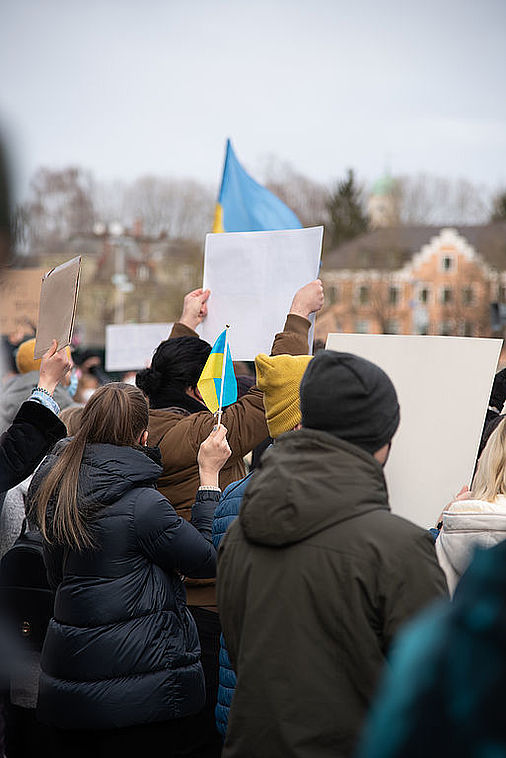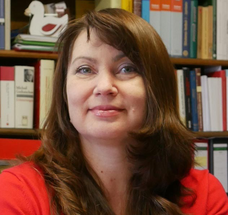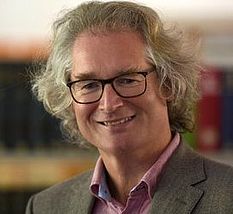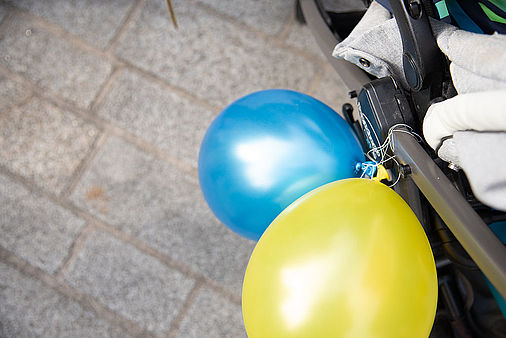Regensburg und die Ukraine
Es geht um mehr als humanitäre Gesten – Ein Interview mit Philipp Schwartz-Fellow Dr. Tetyana Malyarenko und Historiker und IOS-Direktor Professor Dr. Ulf Brunnbauer
20. Dezember 2022
Im Rahmen der Philipp Schwartz-Initiative hat die Universität Regensburg unlängst die Möglichkeit erhalten, ein Philipp Schwartz-Fellowship an die aus dem ukrainischen Donetsk stammende Wissenschaftlerin Dr. Tetyana Malyarenko zu vergeben. Zuletzt war die Forscherin an der Rechtsakademie der Nationalen Universität Odessa tätig. Sie setzt sich mit gesellschaftlichen und wirtschaftlichen Aspekten der Sicherheit in Transitionsstaaten, Human Security, Good Governance sowie sozialen Konflikten und Bürgerkriegen auseinander. Als Fellow am Wilson Center in Washington war die Wissenschaftlerin politikberatend tätig. Derzeit analysiert sie das internationale Krisenmanagement in der Ukraine.
Regensburg ist für die Wissenschaftlerin viel mehr als ein Zufluchtsort – es geht ihr maßgeblich um die Forschung am Standort. Dr. Tetyana Malyarenko und ihrem akademischen Gastgeber, Professor Dr. Ulf Brunnbauer, Inhaber des Lehrstuhls für Geschichte Südost- und Osteuropas an der Universität Regensburg und Wissenschaftlicher Direktor des Leibniz-Instituts für Ost- und Südosteuropaforschung (IOS), ist besonders wichtig, dass der durch das Philipp Schwartz-Fellowship ermöglichte Aufenthalt auch eine neue Form der internationalen akademischen Zusammenarbeit eröffnet - nicht über Länder hinweg, sondern am selben Ort. „Das ist essentiell, wenn man Wissen über ein Land im Krieg erhalten und weiterhin Wissen über dieses Land produzieren will,“ sagt Brunnbauer.
Die UR-Redaktion sprach mit den beiden Wissenschaftler:innen über Flucht von Menschen und Institutionen, über die besondere Beziehung Regensburg-Odessa und die Notwendigkeit langfristigen Engagements durch die Weiterentwicklung akademischer Fördersysteme. Ein baldiges Ende des Krieges in der Ukraine sehen sie nicht.

Foto: Julia Dragan / UR
Displacement
Once again, a warm welcome to you, Dr. Malyarenko. Would you tell us a little bit about your personal experience over the last few years?
TM: I left Ukraine in 2013 when I received an academic fellowship in the United States. I was lucky to be abroad during the start of the open conflict. When I returned from there to my hometown Donetsk, my university – the Donetsk State University of Management – had been displaced because of the so-called separatists taking control of the city, with the support of Russian troops. It had been moved to Mariupol what was then Ukrainian controlled territory. Working there was difficult: All we had was an old, empty building. All our equipment, including the computers and libraries - everything stayed in the occupied territory. Our students had left as well. In 2017, I was invited to continue my academic work at the National University Odessa Academy of Law. I happily took the chance to move there. We are in touch, even though I am conducting research now in Regensburg. I strive for joint projects – my colleagues there face difficult conditions.
What happened to your Donetsk University and your former Donetsk colleagues?
TM: The Ukrainian government decided to unite it with the Mariupol State University, exactly just one month before the invasion started, in January 2022. It was actually a very sad story as for these eight years they built two new campuses. They were very successful in fundraising and received many international grants. Now they were forced to move again, this time to Kyiv. My colleagues are all fine. Some of them are fighting in the war, some left the country in the first days of the war, some left only when Mariupol came under Russian occupation. Some left Ukraine through Russia, others left directly to Europe. Some stay now in Kyiv and other Ukrainian cities.
Now they were forced to move again, this time to Kyiv. My colleagues are all fine. Some of them are fighting in the war, some left the country in the first days of the war, some left only when Mariupol came under Russian occupation. Some left Ukraine through Russia, others left directly to Europe. Some stay now in Kyiv and other Ukrainian cities.
What is the current situation for professors and students in Odessa?
TM: Before 2022, we had around 8000 students at the Odessa Academy of Law. Many of them live abroad now. The University has branches in occupied territories and some close to the frontline, for instance in Cherson, Mykolaiv, and Kryvyi Rih. They have no electricity, they started lessons offline at the beginning of September but had to switch to distance learning again due to shelling. This lack of electricity, in Kyiv, Odessa, basically all over the country, is a major problem. If there is electricity at all, it is only for certain periods of time, mostly for only a few hours per day. The situation is very difficult. At the same time, we are expecting the economic situation in Ukraine to worsen as well, the decline of the GDP will be at least 55%. The Government called off all social expenses. 80% of the state budget is for military, what is left is spent on pensions or salaries for medical personnel.
A special bond
Regensburg and Odessa have been twinned for more than 30 years. What does that mean for academic cooperation?
UB: Long before Ukraine became such a topical theme, there was a thick network of academic cooperation. This was certainly facilitated by the fact that the city of Regensburg partnered with Odessa. Policy makers, civil society, cultural initiatives, and business are in touch. The University of Regensburg has been partnering academic institutions long before the current war - that means before 2014. My predecessor as professor of East European History was Ekkehard Völkl; there was Walter Koschmal who held the chair for Slavic literature. Both had a huge interest in Ukrainian history and literature. There always was a lot of engagement, partnerships between universities and research institutions. You would find cross-faculty cooperation in many disciplines and on different subjects. An interesting example that could be given is the research on Ukrainian displaced persons after World War II. Regensburg was a major center for them. All that was re-discovered in the last couple of years, and UR’s orientation towards Eastern Europe helped to develop this broad engagement with Ukraine – thematically as well as in terms of research cooperation.
In 2018, Tetyana Malyarenko was the first Odessa Fellow of IOS and the City of Regensburg. What is the impact of such fellow programs? 
UB: This joint research fellow program for scientists working in the “oblast” or district of Odessa aims at strengthening the partnership between the cities of Regensburg and Odessa, as well as between the IOS and academic institutions in Odessa. The Regensburg city government bears half of the costs of the fellowship, the other half our institute. For many years, IOS has been running an interdisciplinary working group on Ukraine with economists and political scientists working together. Tetyana already cooperated with them. We recruited scholars from Ukraine and invited visiting scholars from there. This led to networks which helped us establishing the current ‘emergency program’ for scholars who escaped the Russian invasion. There is a reason why Regensburg is among the top places when it comes to providing support to Ukrainian scholars after 24 February. (Foto: neverflash.com)
Long-term commitment
What makes working in Regensburg special for you, Dr. Malyarenko?
TM: I was based in Washington D.C., in the center of decision-making processes between all think tanks involved in the Ukrainian issue. But they are mostly focusing on consulting. Analytic papers are produced very quickly, and their life cycle is not very long. If something happens, you must respond immediately and provide decision-makers with some ‘food’. Here, we focus much more on long-term research trends. I work with theories, data, and new methods. Living and working in Regensburg is another step in my academic career. Me as well as other Ukrainian colleagues want to contribute to research and academic life. We consider ourselves not as refugee scholars who just want to be in some safe place. We are members of a university community, we want to work on joint projects, publish papers, and be involved in activities with students.
UB: It’s exactly as Tetyana says: support for scientists like her is not a humanitarian gesture, it is a crucial form of academic collaboration. The way how we understand area studies in Regensburg is to work together with people from the region. As working in the region is currently not possible, this is a new form of international collaboration, not across countries but at the very same place, i.e., in Regensburg. If you want to maintain knowledge and to continue producing knowledge about a country in war, you depend on people like Tetyana and her colleagues who come to Regensburg and other places, and who are excellent scholars. I think that is really something that also the relevant ministries in Germany should be aware of when it comes to support schemes.
How should such support schemes for scholars from Ukraine look like?
UB: There must be a long-term integration of those scholars who for obvious reasons cannot return - even though they want to return at the first possible moment. But we also know that this is not going to happen soon. And if many universities in Ukraine will be destroyed, there won’t be much money for research activities after the war, given the needs of basic reconstruction of a country destroyed by Russia’s aggression. We need to offer Ukrainian scholars a long-term perspective wherever they want to be – in Ukraine, or in other parts of Europe.

Foto: Julia Dragan / UR
A long war
You just came back from a Ukraine conference in Oxford where you spoke about the failure of mediation in preventing an armed conflict in Ukraine…
TM: Stating that mediation failed is not very popular. And it is a rather sensitive topic. It affects many people involved in mediation – in Ukraine, in international organizations like the OSCE, the UN, the leaders of Germany and France. Anyway, we must study why it failed. We need to explore our experiences and figure out what should be done when it comes to conflict prevention and a peace settlement in the future.
What would be lessons already learned?
TM: International organizations must be revised when it comes to their mandate and role. Just take the United Nations: The resolutions of the General Assembly have zero impact, and the Security Council is paralyzed. There are ideas like excluding Russia from the Security Council or to bring new members in, like India, or Brazil. But I doubt that this helps. Basically, you will have to destroy the UN if you want to push out Russia from the Security Council. Even if you wanted to do that - it would be a long and bureaucratic process. At the same time, each conflict has its own life cycle. Conflict parties usually do not trust each other when it comes to the process of establishing peaceful connections. Mediation only has a chance if one party really wants to stop the conflict.
This sounds like there is no quick end in sight to this war....
TM: Currently, the conflict in Ukraine is stuck: Neither Russia nor Ukraine wants to compromise. Minor, nonetheless important things might work out: prisoner exchanges for example. There might be also some agreement regarding humanitarian issues and the civilian population. But there won’t be an end to fighting. Both – Ukraine and the Russian Federation – believe that their country will win this war. Both believe as well that they have the capacity to win.
UB: I agree with Tetyana, this will be a very long war. At the end neither Ukraine itself nor the West can afford Ukraine losing the war. But Putin also cannot afford it. Hopefully, in the long run, Russia just lacks the resources to win. However, they certainly don’t lack the brutality. And the willingness to violate international law.
What does “a long war” mean in this case?
UB: It is difficult to assess, but look at former Yugoslavia, at the war in Bosnia, where the combatants had much less resources. Nevertheless, it took more than four years. This might be the time horizon also in this case.
TM: …or more. If you consider that the war basically started in 2014, we have war in Ukraine for eight years. During this period, there were times of higher and lower intensity of fighting. I expect combat actions will continue this way.
UB: That is very possible. Obviously, Russia cannot maintain to keep up this high intensity campaign for long. They might be running out of ammunition. But a low intensity war is presumable. Also from the Ukrainian side, they will continue reclaiming occupied territories and they have all the right to do this. But kicking out the Russians from the areas in the Donbass they control since 2014 and from Crimea will be difficult.
TM: Now they found a very cheap solution - targeting civilian infrastructure with Iranian drones…
UB: Nevertheless, Ukraine learns very quickly. But as long as Putin is in power, we cannot expect an end to this war in form of a peace agreement or something similar.
A different place in Europe
Is there anything that could make a difference?
UB: The huge resilience of the Ukrainian society. Look just at the fact that the state continues to be operational although there is shelling every day. Garbage is collected, infrastructure is quickly repaired. It shows ingenuity and people working together. This is a lesson that Europe can learn from: If there is a collective effort, you can turn things around. We can learn from Ukrainian experiences. Hoping that Ukraine will prevail I do think Ukraine’s place in Europe will be a very different one after the war.
So, one should stay optimistic though both of you expect the war to continue for years?
UB: There might be also some space for optimism. What we can see now is how much Ukraine has developed in the last couple of years. It is on a very different track from Russia – with all the problems it has. We all know that the country is not free of corruption and there are shadowy sides in Ukrainian politics. On the other hand, I think the achievements are astonishing. We see that now by all the competencies and the resilience of the people who leave their country bring with them. We have several Ukrainians conducting research in Regensburg, besides Tetyana there are five more young researchers who fled the war in our Graduate School. It is amazing to see how they go on with their research, always looking optimistic forward. Personally, I would fall in deep depression in a situation like this. But they carry on in a very patriotic way – and patriotic in a positive sense – with the vision to change their country that suffered a lot from past policy errors.
twa.
Informationen/Kontakt
Die Philipp Schwartz-Initiative wurde von der Alexander von Humboldt-Stiftung gemeinsam mit dem Auswärtigen Amt ins Leben gerufen und ermöglicht Universitäten, Fachhochschulen und außeruniversitären Forschungseinrichtungen in Deutschland die Verleihung von Fellowships für Forschungsaufenthalte an gefährdete Forscherinnen und Forscher. Zur Philipp Schwartz-Initiative der Alexander von Humboldt-Stiftung
Zu Dr. Tetyana Malyarenko
Zum Lehrstuhl für Geschichte Südost- und Osteuropas der Universität Regensburg und zu Prof. Dr. Ulf Brunnbauer
Stadt und akademisches Regensburg kennt Tetyana Malyarenko seit 2018, als sie am gemeinsamen Forschungsstipendienprogramm der Stadt Regensburg und des Leibniz-Instituts für Ost- und Südosteuropaforschung (IOS) teilnahm. Odessa Fellowships des IOS




